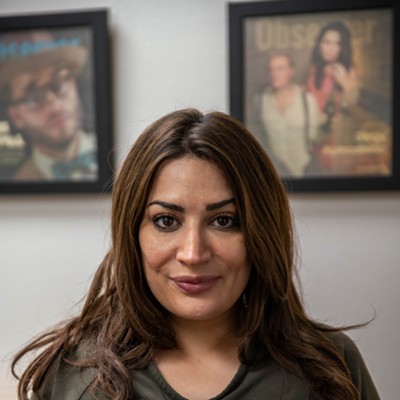Garrett Owen has grown used to hearing people say that his sound doesn't match his look. "I've been getting this for years," he says. "'I looked at you and didn't think you'd be very good.' "
Owen is introverted, wears a Stetson hat paired with a member's only jacket, and he maintains a soft Southern twang despite having lived most his life away from his native U.S. In contrast, his music is the definition of sensitive singer-songwriting, his airy falsetto grounded by the tough guitar-picking and the lyrics' violent imagery.
After years on hiatus, Owen just resumed his musical career with a new album, which has a tentative release date for January. Owen has also been touring with Dallas' Matt Tedder, a contestant on The Voice, who praises him highly. "Garrett's talents are purely hypnotic," Tedder says.
Owen was born in San Antonio, but spent his first two years of life in the Texas town of Comfort, population 2,300. His missionary family moved him to Africa, first to Tanzania, then to Kenya. He returned to the United States at 10 and settled in Louisiana for three years, then moved to Ecuador.
For all his travels, Owen didn't pick up many languages. He says that he suffered from so many learning disabilities that his teachers didn't bother to teach him the local languages. "Whenever I'd encounter a struggle at school, the principal would go 'Oh, we won't make him do anything hard 'cause he's stupid,'" he says. "Nobody ever said that, but that's how people treated me, and I behaved accordingly. "
Owen says that doctors told his parents that he likely wouldn't be able to learn how to read, so the family moved to Nairobi so that he'd receive speech therapy from an eminent pathologist. "She probably saved my life a little bit," he says of his therapist.
At the International School of Kenya, he grew up with hundreds of different nationalities: "Oil kids, diplomatic children and some missionary kids." His childhood memories include building churches with his dad in remote parts of East Africa, and looking for safari animals out the car windows while traveling.
While in Ecuador, Owen first picked up a guitar at age 14, after watching an older friend play the instrument over the phone for a girl. "Almost everything I learned about playing guitar, for six years, I learned from guitar magazines," he says. In high school he joined a band which played mostly metal covers.
Owen relays feeling a sense of personal diaspora and "awful culture shock" upon returning home to Texas at age 20. "I felt a certain amount of alienation everywhere, but I felt very at home in these foreign places," he says. "But there's still this overwhelming reality that I wasn't born there."
Owen admits that he hadn't yet grasped any social skills when he left to study jazz music in a small community college in Levelland, near Lubbock. The rigid curriculum clashed with the romantic notion Owen had imagined — a vision of learning standards and gypsy jazz — so he dropped out. Owen then moved back in with his parents and got a job as a cart pusher at Wal-Mart, where he was first promoted to cashier, then demoted when a con artist tricked him into giving him $150 in change.
It was around then that he attempted suicide. "I was just depressed about working at Wal-Mart and not being an artist," he says. After a few days in the psych ward, he began mandatory therapy, but found a greater outlet in music. He says he quit taking antidepressants the day after he attended his first open mic.
He eventually released an EP, though he says its release amounted to little more than a party. "I didn't understand anything about real publicity," he says. "I just released this record and shortly thereafter it fizzled out; there was no real buzz."
Owen left the music scene soon after, in favor of focusing on a relationship which lasted for three years, and became a personal trainer for patients with severe mental health disorders. He sustained a massive injury while powerlifting, ending his career and sending him back to music.
In the past year Owen's become a full-time musician, playing mostly in Fort Worth and Austin. Producer Taylor Tatsch contacted him at musician Steve Jackson's recommendation and together they recorded an album analog to tape. "I've taken all these things I've learned in jazz and applied them to a folky thing," Owen says. He calls his sound "outlaw folk."
Owen may be obscure even by local musician standards, but he's garnered support from the local songwriting intelligentsia. Orchestral folk singer Jacob Metcalf calls Owen an "agile, intricate, accomplished guitar player who sings honey-dipped melodies about devastating turns of events. His pain soothes listeners, his performances leave audiences paralyzed."
After a life of travel and introspection, Owen may have finally found his place after all.
[
{
"name": "Air - MediumRectangle - Inline Content - Mobile Display Size",
"component": "18855504",
"insertPoint": "2",
"requiredCountToDisplay": "2"
},{
"name": "Editor Picks",
"component": "17105533",
"insertPoint": "4",
"requiredCountToDisplay": "1"
},{
"name": "Inline Links",
"component": "18349797",
"insertPoint": "8th",
"startingPoint": 8,
"requiredCountToDisplay": "7",
"maxInsertions": 25
},{
"name": "Air - MediumRectangle - Combo - Inline Content",
"component": "17105532",
"insertPoint": "8th",
"startingPoint": 8,
"requiredCountToDisplay": "7",
"maxInsertions": 25
},{
"name": "Inline Links",
"component": "18349797",
"insertPoint": "8th",
"startingPoint": 12,
"requiredCountToDisplay": "11",
"maxInsertions": 25
},{
"name": "Air - Leaderboard Tower - Combo - Inline Content",
"component": "17105535",
"insertPoint": "8th",
"startingPoint": 12,
"requiredCountToDisplay": "11",
"maxInsertions": 25
}
]











